英语教师课堂提问共47页文档
小学英语即兴问答模板范文

小学英语即兴问答模板范文Teacher: Good morning, class! How are you today?老师:同学们早上好!你们今天好吗?Student 1: Good morning, teacher! I'm feeling great today.学生1:老师早上好!我今天感觉很棒。
Student 2: 早上好,老师!我也感觉很好。
学生2:Good morning, teacher! I feel good too.Teacher: That's wonderful to hear. Let's start our English conversation practice.老师:听到这个消息真是太好了。
让我们开始我们的英语会话练习吧。
Student 1: Sure, I'm ready!学生1:当然,我准备好了!Student 2: 我也准备好了!学生2:I'm ready too!Teacher: Great! Let's talk about our favorite activities. What do you like to do after school?老师:太好了!让我们谈谈我们喜欢的活动。
放学后你们喜欢做什么?Student 1: I love playing soccer with my friends.学生1:我喜欢和朋友一起踢足球。
Student 2: 我喜欢画画,我觉得画画很有趣。
学生2:I like drawing, I think drawing is very interesting.Teacher: Those are great activities! Playing sports and being creative are important for staying healthy and happy.老师:这些都是很棒的活动!参加体育运动和发挥创造力对于保持健康和快乐都很重要。
英语课堂教学提问
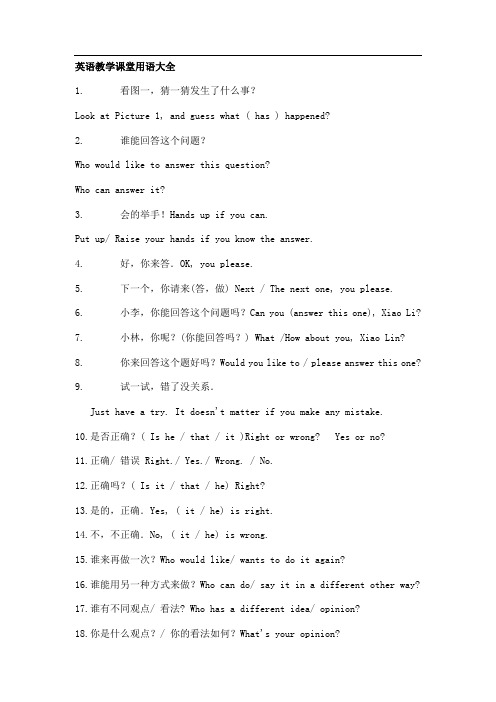
英语教学课堂用语大全1. 看图一,猜一猜发生了什么事?Look at Picture 1, and guess what ( has ) happened?2. 谁能回答这个问题?Who would like to answer this question?Who can answer it?3. 会的举手!Hands up if you can.Put up/ Raise your hands if you know the answer.4. 好,你来答.OK, you please.5. 下一个,你请来(答,做) Next / The next one, you please.6. 小李,你能回答这个问题吗?Can you (answer this one), Xiao Li?7. 小林,你呢?(你能回答吗?) What /How about you, Xiao Lin?8. 你来回答这个题好吗?Would you like to / please answer this one?9. 试一试,错了没关系.Just have a try. It doesn't matter if you make any mistake.10.是否正确?( Is he / that / it )Right or wrong? Yes or no?11.正确/ 错误 Right./ Yes./ Wrong. / No.12.正确吗?( Is it / that / he) Right?13.是的,正确.Yes, ( it / he) is right.14.不,不正确.No, ( it / he) is wrong.15.谁来再做一次?Who would like/ wants to do it again?16.谁能用另一种方式来做?Who can do/ say it in a different other way?17.谁有不同观点/ 看法? Who has a different idea/ opinion?18.你是什么观点?/ 你的看法如何?What's your opinion?19.没听清,请你再说一遍.( I beg your ) pardon?I didn't hear clearly. Please say it again/ repeat it.20.请大声点.( A little ) Louder, please.21.稍慢点读.Read ( a bit ) slower.22.肃静,你们最好不要在课堂上说话.Be quiet./ Keep silent. You'd better not talk in class.23.管好自己的事/ 别管闲事.Mind your own business.24.不要朝窗外看.Don't look out of the window.实用课堂教学用语(四)25.下面学习生词.Now word study.26.注意发音.Pay attention to your pronunciation.27.注意听我说,并观察我的动作,然后猜词意.Listen to me carefully and watch my actions, then guess the meaning of the word.28.你们听明白/ 懂了吗? Are you clear?Do you catch my idea?29.这个词是什么意思?What's the meaning of the word?30.汉语意思是什么?The Chinese ( meaning).Give the Chinese for it.31.好了,我们学习第二部分对话.Well, let's come to Part II, the dialogue.Well, let's come to the dialogue in Part II.32.下面听录音,听前快速看一下黑板上的问题.Now listen to the tape. Before listening, read through the questions on the blackboard.33.听音时合上书.Close/ Shut your books while listening.Books closed. / shut while listening to the tape.Listen to the tape with your books closed/ shut.Listen to the tape without your books.34.回答黑板上的问题.Answer the questions on the blackboard.35.我们来核对答案.Let's check the answers.36.一题,哪个正确?No. 1, which one is right?37.下一个,哪个正确?Next, which is the right answer?38.最后一题最难,正确答案是C,选对的举手.The last( one ) is the most difficult/ hardest. The right answer is C. Put up your hands if you choose right.39.再听一遍,并跟着读.Listen to the tape again and read after it.Now, once again/ more /over, read after it this time.40.注意语调.Pay attention to your intonation.41.好啦,就听到这.OK, stop here.42.打开书,两人一组读对话.Open your books and read the dialogue in pairs.43.口答练习册上的习题一. Do Exercise One in the workbook orally.Now, workbook, Exercise 1, do it orally.Answer the questions of Exercise 1 in your workbooks orally.实用课堂教学用语(五)1. 谁能帮他指出来?Who can point it out?/ Who can correct the mistakes for him?2. 注意,不要再犯同样的错误.Be careful./ Take care. Don't make the same mistake again.3. 好了,接着来.Well, let's go on ( with it )4. 接下去做习题.Let's go on to do the exercises.5. 看动作猜猜他们在干什么?Look at them/ their actions and guess what they are doing.6. 下面进行书面作业?Now written work.7. 用下列词语写一篇150字的短文,十分钟完成.Write a 150-word passage with / using the following expressions in ten minutes.8. 写一段对话尽可能使用列词语.Make a dialogue using the following expressions as much as you can/ possible.9. 写完了吗?Have you finished it/ the writing? Finish up?10.我找两名同学,把你们写的对话读出来.I ask 2 students to read out their dialogues.11.下面学习课文.Now we study / learn the text.12.你知道某人或某事吗?/ 你听说过…吗?你能谈一谈他的情况?Do you know sb./ sth? Have you heard of sb./ sth?13.今天,我们学习一篇关于…的文章.Today we'll learn a passage/ an article about sb./sth.14.首先,我给大家介绍课文大意.First I tell you the main/ general idea about it.15.快速读课文,并找到这个问题的答案.OK. Now read the text quickly and find out the answer to this question.100. 谁找到答案了?Who find/ know the answer?101. 再细读一遍课文,然后回答练习册24页上的问题.Read it in detail/ more carefully for the second time, then answer the answer questions on Page 24 of your workbooks.102. 找出疑难点.Find out the difficulties and what you don't understand.103. 谁能帮他解答这个问题?Who can help him with the question?Who can help him out?104. 你最好用英语说.You'd better say it in English.105. 如果你用英语说有困难,可以用汉语.You may say it in Chinese if you have difficulty in speaking English / can't speak it in English.106. 好,我告诉你们这两个句子的区别.OK. I tell you the differences between the two sentences.107. 这两个词有什么不同? What's the difference between the two words?108. 请举例说明. ( Give us ) An example, please.109. 这个词可以这样用. We can use it (in) this way / like this.英语实用课堂教学用语(六)110. 例如 For example/ instance.111. 现在你能区分A和B吗?Can you tell A from B now?112. 分组讨论 OK. Now let's discuss the groups.113. 我提一个问题供大家讨论.I give you a question for discussion.114. 你认为这篇文章怎么样?What do you think of the article?How do you like the article?How do you find the article?115. 你从课文中学到了什么? What have you learned from the text? 116. 别着急,慢慢来。
英语教师面试100问优秀解答
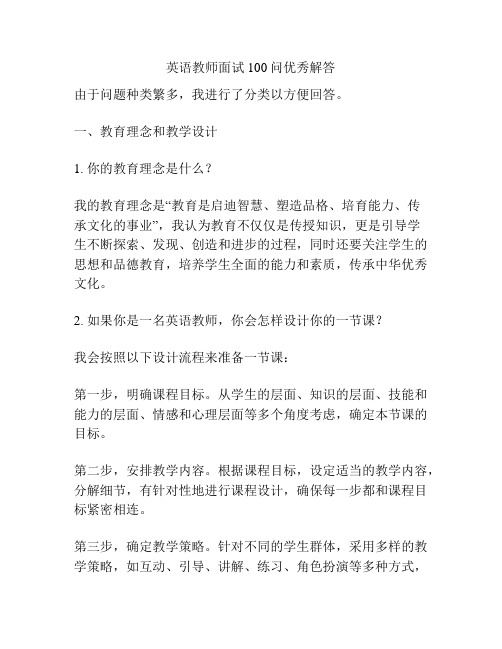
英语教师面试100问优秀解答由于问题种类繁多,我进行了分类以方便回答。
一、教育理念和教学设计1. 你的教育理念是什么?我的教育理念是“教育是启迪智慧、塑造品格、培育能力、传承文化的事业”,我认为教育不仅仅是传授知识,更是引导学生不断探索、发现、创造和进步的过程,同时还要关注学生的思想和品德教育,培养学生全面的能力和素质,传承中华优秀文化。
2. 如果你是一名英语教师,你会怎样设计你的一节课?我会按照以下设计流程来准备一节课:第一步,明确课程目标。
从学生的层面、知识的层面、技能和能力的层面、情感和心理层面等多个角度考虑,确定本节课的目标。
第二步,安排教学内容。
根据课程目标,设定适当的教学内容,分解细节,有针对性地进行课程设计,确保每一步都和课程目标紧密相连。
第三步,确定教学策略。
针对不同的学生群体,采用多样的教学策略,如互动、引导、讲解、练习、角色扮演等多种方式,以培养学生的学习兴趣和能力。
第四步,评估学生表现。
通过课堂互动、分组讨论、测试评估等多种方式,及时掌握学生学习情况,进行相关调整。
最后,教师和学生共同总结课堂成效,反思一同进步。
3. 你怎么在课堂中激发学生的兴趣?学生的兴趣是提高学生的学习效果的重要因素。
在课堂中,我会尝试以下策略来激发学生的兴趣:①灵活运用多种教学策略,如游戏、故事、音乐、实验等吸引学生;②创新课堂形式,采用互动式、探究式、启发式等教学方法,培养学生的主动性和创新思维;③注重课堂展示,被动接收不如主动表达,鼓励学生在课堂上展示自己的成果和思考;④注重课程设计,将学生的实际需求、兴趣和能力纳入课程设计,确保课堂内容贴近学生生活。
4. 你怎么鼓励学生积极思考、自主学习?我会采取以下措施:①创造积极的学习环境:在课堂中,通过教师与学生、学生之间、学生与课堂之间形成互动关系,在愉快的学习氛围中,鼓励学生提出问题,大胆探索,积极思考。
②采用开放式问题:让学生自由思考、团结合作,提高学生的求知欲,运用不同的角度说出自己的看法。
问外教的100个问题
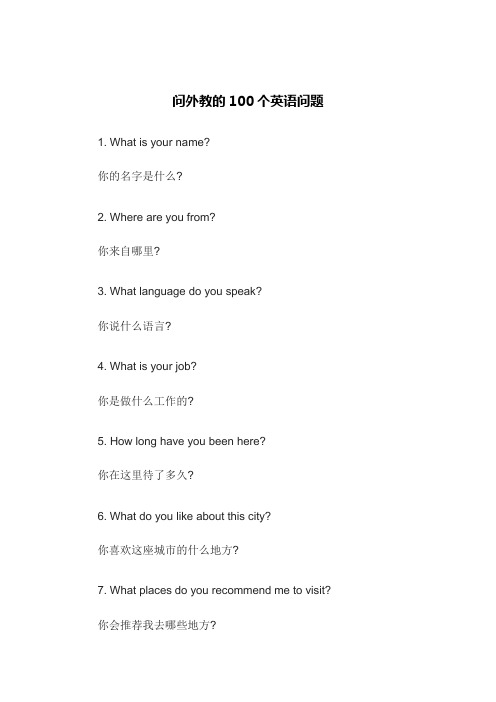
问外教的100个英语问题1. What is your name?你的名字是什么?2. Where are you from?你来自哪里?3. What language do you speak?你说什么语言?4. What is your job?你是做什么工作的?5. How long have you been here?你在这里待了多久?6. What do you like about this city?你喜欢这座城市的什么地方?7. What places do you recommend me to visit?你会推荐我去哪些地方?8. What is your favorite food?你最喜欢吃什么食物?9. Do you have any pets?你有宠物吗?10. What is your favorite hobby?你最喜欢的爱好是什么?11. What is your favorite music?你最喜欢的音乐是什么?12. What is your favorite movie?你最喜欢的电影是什么?13. What is your favorite TV show?你最喜欢的电视节目是什么?14. What is your favorite book?你最喜欢的书籍是什么?15. How do you spend your free time?你平时有什么爱好?16. What do you think of Chinese culture?你觉得中国文化怎么样?17. What do you think of Chinese food?你觉得中国食物怎么样?18. What do you think of Chinese people?你觉得中国人怎么样?19. Have you learned any Chinese?你会说一些中文吗?20. What is your favorite Chinese word?你最喜欢的中文词语是什么?21. What is your impression of China?你对中国有什么印象?22. What is your favorite Chinese holiday?你最喜欢的中国节日是什么?23. What is your favorite Chinese dish?你最喜欢的中国菜是什么?24. What is your favorite Chinese movie?你最喜欢的中国电影是什么?25. What is your favorite Chinese TV show?你最喜欢的中国电视节目是什么?26. What cultural differences have you noticed between your country and China?你觉得你的国家和中国有哪些文化差异?27. What do you think of Chinese education?你觉得中国的教育怎么样?28. What is something unique about your country?你的国家有什么独特的东西?29. What do you miss about your country?你想念你国家的什么?30. What is the most difficult thing about learning English?学习英语最困难的是什么?31. What is the best way to improve your English?提高英语水平的最佳方法是什么?32. What is the difference between American English and British English?美国英语和英国英语有什么区别?33. What are some common English expressions?有哪些常见的英语表达?34. Can you teach me some slang?你可以教我一些俚语吗?35. What is the best way to practice speaking English?练习英语口语最好的方法是什么?36. What is the difference between "affect" and "effect"?"affect"和"effect"有什么区别?37. What is the difference between "there", "their", and "they're"?"there"、"their"和"they're"有什么区别?38. What is the difference between "your" and "you're"?"your"和"you're"有什么区别?39. What does "s/he" mean?"s/he"是什么意思?40. What is the difference between "it's" and "its"?"it's"和"its"有什么区别?41. What are some common English idioms?有哪些常见的英语习语?42. How should I use "shall" in English?如何使用"shall"?43. What is the difference between "may" and "might"? "may"和"might"有什么区别?44. What is the difference between "can" and "could"? "can"和"could"有什么区别?45. What is the difference between "should" and "would"? "should"和"would"有什么区别?46. What is the difference between "will" and "shall"? "will"和"shall"有什么区别?47. What is the difference between "must" and "have to"?"must"和"have to"有什么区别?48. How do I use contractions in English?如何使用缩略词?49. What are some common English abbreviations?有哪些常见的英语缩写?50. What is the difference between "learn" and "teach"?"learn"和"teach"有什么区别?51. How can I improve my writing in English?如何提高英语写作水平?52. What is the difference between "who" and "whom"?"who"和"whom"有什么区别?53. How do I use commas, periods, and other punctuation in English?如何使用英语中的逗号、句号及其他标点符号?54. What is the difference between "few" and "little"?"few"和"little"有什么区别?55. What is the difference between "farther" and "further"? "farther"和"further"有什么区别?56. What is the difference between "good" and "well"? "good"和"well"有什么区别?57. How do I use "the" in English?如何使用"the"?58. What is the difference between "much" and "many"? "much"和"many"有什么区别?59. How do I use "a" and "an" in English?如何使用"a"和"an"?60. What is the difference between "who" and "that"? "who"和"that"有什么区别?61. What is the difference between "like" and "as"? "like"和"as"有什么区别?62. How do I use the verb "to be" in English?如何使用英语中的动词"to be"?63. What is the difference between "in" and "on"? "in"和"on"有什么区别?64. What is the difference between "go" and "come"? "go"和"come"有什么区别?65. What is the difference between "make" and "do"? "make"和"do"有什么区别?66. What is the difference between "take" and "bring"? "take"和"bring"有什么区别?67. What is the difference between "say" and "tell"? "say"和"tell"有什么区别?68. What is the difference between "hear" and "listen"? "hear"和"listen"有什么区别?69. What is the difference between "look" and "see"? "look"和"see"有什么区别?70. What is the difference between "read" and "write"? "read"和"write"有什么区别?71. How do I use prepositions in English?如何使用英语中的介词?72. What is the difference between "since" and "for"? "since"和"for"有什么区别?73. What is the difference between "beside" and "besides"? "beside"和"besides"有什么区别?74. What is the difference between "between" and "among"? "between"和"among"有什么区别?75. What is the difference between "into" and "in to"? "into"和"in to"有什么区别?76. What is the difference between "onto" and "on to"? "onto"和"on to"有什么区别?77. What is the difference between "over" and "above"? "over"和"above"有什么区别?"under"和"below"有什么区别?79. What is the difference between "within" and "inside"? "within"和"inside"有什么区别?80. What is the difference between "toward" and "towards"? "toward"和"towards"有什么区别?81. What is the difference between "via" and "by"? "via"和"by"有什么区别?82. What is the difference between "without" and "outside"? "without"和"outside"有什么区别?83. What is the difference between "about" and "around"? "about"和"around"有什么区别?84. What is the difference between "across" and "over"? "across"和"over"有什么区别?85. What is the difference between "beneath" and "underneath"? "beneath"和"underneath"有什么区别?"by"和"through"有什么区别?87. What is the difference between "next to" and "beside"? "next to"和"beside"有什么区别?88. What is the difference between "in front of" and "before"? "in front of"和"before"有什么区别?89. What is the difference between "behind" and "at the back of"? "behind"和"at the back of"有什么区别?90. What is the difference between "in" and "inside"? "in"和"inside"有什么区别?91. What is the difference between "out" and "outside"? "out"和"outside"有什么区别?92. What is the difference between "over" and "below"? "over"和"below"有什么区别?93. What is the difference between "across" and "around"? "across"和"around"有什么区别?94. What is the difference between "between" and "amongst"?"between"和"amongst"有什么区别?95. What is the difference between "beneath" and "under"?"beneath"和"under"有什么区别?96. What is the difference between "upon" and "on"?"upon"和"on"有什么区别?97. What is the difference between "amid" and "amidst"?"amid"和"amidst"有什么区别?98. What is the difference between "equal to" and "equivalent to"?"equal to"和"equivalent to"有什么区别?99. What is the difference between "where" and "whither"?"where"和"whither"有什么区别?100. What is the difference between "who" and "whom"?"who"和"whom"有什么区别?。
(完整版)英语教师面试问题经典合集
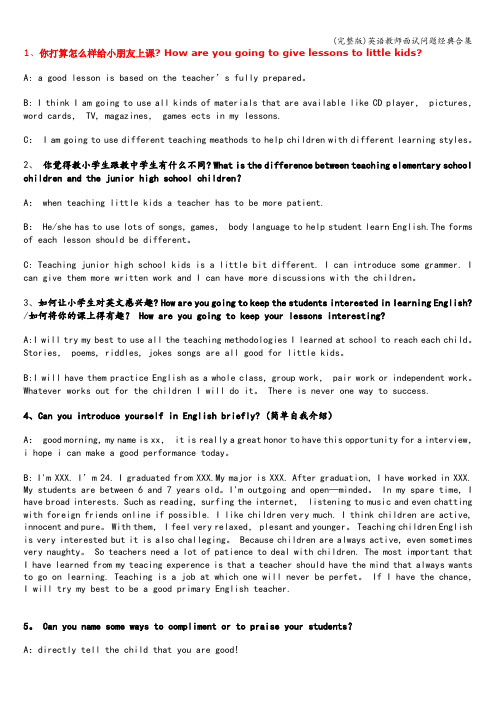
1、你打算怎么样给小朋友上课? How are you going to give lessons to little kids?A: a good lesson is based on the teacher’s fully prepared。
B: I think I am going to use all kinds of materials that are available like CD player, pictures,word cards, TV, magazines, games ects in my lessons.C: I am going to use different teaching meathods to help children with different learning styles。
2、你觉得教小学生跟教中学生有什么不同? What is the difference between teaching elementary school children and the junior high school children?A: when teaching little kids a teacher has to be more patient.B: He/she has to use lots of songs, games, body language to help student learn English.The forms of each lesson should be different。
C: Teaching junior high school kids is a little bit different. I can introduce some grammer. I can give them more written work and I can have more discussions with the children。
问外教的100个问题

问外教的100个问题在学习外语的过程中,往往会遇到各种问题,而请教外教则是一个很好的解决办法。
在向外教请教问题时,我们往往需要有条不紊地提出问题,这样才能更好地获取解答。
下面列举了100个问题,希望对大家在和外教交流中有所帮助。
1. What’s your name?2. Where are you from?3. How long have you been teaching?4. What do you like most about teaching?5. How many languages do you speak?6. Have you ever visited my country?7. What’s your favorite English word?8. How do you improve your English skills?9. Can you recommend some good English books?10. How do you practice speaking English?11. What’s the most diffic ult part of learning English?12. How can I improve my pronunciation?13. Can you explain this grammar rule to me?14. What’s the best way to memorize vocabulary?15. Do you have any tips for writing essays?16. Where can I find good English movies to watch?17. Can you recommend some English songs for me to listen to?18. How do I prepare for an English exam?19. What’s the difference between British English and American English?20. Can you help me with my accent?21. How can I sound more natural when speaking English?22. What should I do to improve my listening skills?23. How do I overcome my fear of speaking in English?24. Can you correct my mistakes when I speak?25. What do you think is the key to becoming fluent in English?26. How do you deal with difficult students?27. Do you have any teaching tips for me?28. How do you keep your students motivated?29. What’s the most rewarding part of teaching?30. Can you recommend some English websites for me to practice?31. How do I avoid common mistakes in English?32. How do I get better at reading comprehension?33. Can you explain this English joke to me?34. What’s the best way to expand my vocabulary?35. How do I improve my writing skills?36. Can you recommend some English podcasts for me to listen to?37. What’s the difference between formal and informal English?38. How do I improve my speaking fluency?39. Can you recommend some English apps for me to use?40. What’s the best way to learn English grammar?41. How do I get better at English conversation?42. Can you recommend some English magazines for me to read?43. How do I avoid using Google Translate too much?44. What’s the best way to learn English idioms?45. How do I become more confident in speaking English?46. Can you recommend some English novels for me to read?47. What’s the best way to learn English prepositions?48. How do I improve my English vocabulary quickly?49. Can you recommend some English games for me to play?50. What’s the best way to learn English phrasal verbs?51. How do I get better at English listening comprehension?52. Can you recommend some English exercises for me to do?53. What’s the best way to learn English tenses?54. How do I improve my English pronunciation quickly?55. Can you recommend some English videos for me to watch?56. What’s the best way to learn English spelling?57. How do I get better at English grammar?58. Can you recommend some English websites for me to visit?59. What’s the best way to learn English vocabulary?60. How do I improve my English speaking skills quickly?61. Can you recommend some English songs for me to sing?62. What’s the best way to learn English verb tenses?63. How do I get better at English writing?64. Can you recommend some English texts for me to read?65. What’s the best way to learn English vocabulary words?66. How do I improve my English speaking fluency quickly?67. Can you recommend some English teachers for me to follow?68. What’s the best way to learn English words?69. How do I get better at English listening skills?70. Can you recommend some English podcasts for me to listen to?71. What’s the best way to learn English writing skills?72. How do I improve my English speaking ability quickly?73. Can you recommend some English resources for me to use?74. What’s the best way to learn English vocabulary quickly?75. How do I get better at English pronunciation?76. Can you recommend some English videos for me to watch?77. What’s the best way to learn English grammar rules?78. How do I improve my English speaking fluency?79. Can you recommend some English websites for me to visit?80. What’s the best way to learn English sentences?81. How do I get better at English listening comprehension?82. Can you recommend some English exercises for me to do?83. What’s the best way to learn English vocabulary words?84. How do I improve my English speaking skills quickly?85. Can you recommend some English songs for me to sing?86. What’s the best way to learn English verb tenses?87. How do I get better at English writing?88. Can you recommend some English texts for me to read?89. What’s the best way to learn English vocabulary words?90. How do I improve my English speaking fluency quickly?91. Can you recommend some English teachers for me to follow?92. What’s the best way to learn English words?93. How do I get better at English listening skills?94. Can you recommend some English podcasts for me to listen to?95. What’s the best way to learn English writing skills?96. How do I improve my English speaking ability quickly?97. Can you recommend some English resources for me to use?98. What’s the best way to learn English vocabulary quickly?99. How do I get better at English pronunciation?100. Can you recommend some English videos for me to watch?在与外教交流时,提出问题是很重要的。
四年级上册英语46页和47页

四年级上册英语教材的46页和47页内容是关于描述动物的部分。
这部分教材旨在教授学生关于动物的基本知识和描述动物外貌的能力。
通过这些内容,学生可以学习一些常见动物的英文名称并且能够用简单的句子描述这些动物的外貌特征。
下面我将根据46页和47页的内容进行详细的介绍和分析。
一、46页1. 46页的主要内容是介绍了几种常见的动物,包括tiger(老虎)、elephant(大象)、panda(熊猫)和 giraffe(长颈鹿)。
2. 对于每种动物,教材都给出了它们的英文名称,并且配有生动的插图。
这样的设计可以帮助学生更直观地理解动物的外貌特征,并且通过对比来记忆它们的英文名称。
3. 教材还附带了一些简单的描述性词语,比如big(大)、small (小)、long(长)等,这些词语可以帮助学生更准确地描述动物的外貌特征。
4. 教材还设计了一些简单的问答和填空题目,让学生通过这些练习来巩固所学的知识,并且提高他们的英文表达能力。
二、47页1. 47页的内容是基于46页的学习内容进行的延伸。
这一页的主要内容是引导学生根据46页所学的知识来描述不同动物的外貌特征。
2. 通过丰富多彩的插图和简短的句子,教材让学生们有机会运用所学的词汇和句型来进行描述。
“It’s big. It has a long neck. It’s brown and yellow.”这样简单的句子可以帮助学生更流利地描述动物的外貌。
3. 教材设计了一些互动性很强的活动,比如老师可以用图片引导学生猜测动物的名称,并且通过简单的句子来描述这些动物。
这样的互动设计能够激发学生学习的兴趣,让他们更愿意参与到课堂学习中来。
4. 通过这些练习,学生可以逐渐培养自己观察、描述和表达的能力,同时也为将来更深入的学习打下了基础。
四年级上册英语的46页和47页内容设计合理,通过生动的插图、简单的句子和丰富的练习,可以帮助学生快速、有效地学习和掌握动物的英文名称以及对动物的描述能力。
英语课堂教学常见问题教师调查问卷

英语课堂教学常见问题教师调查问卷第一篇:英语课堂教学常见问题教师调查问卷英语课堂教学常见问题教师调查问卷1.你的课前教学准备是否充分?()A.是B.否C.一般2.你是否能够使学生做好上课前的准备?()A.是B.否C.一般3.你课前是否备有教案?()A.是B.否C.一般4.你的教学内容是否正确、科学、系统?()A.是B.否C.一般5.你的教学内容是否充实、教学形式是否多样?()A.是B.否C.一般6.你的教学内容是否利用多媒体课件?()A.是B.否C.一般7.你的课堂教学是否体现了教学的目的、任务要求?()A.是B.否C.一般8.你的教法是否灵活、是否体现学生的主体地位和教师的指导作用?(A.是B.否C.一般9.你的教学组织是否得力、是否贯穿始终?()A.是B.否C.一般10.你的课题导入是否简洁、自然、有道理?()A.是B.否C.一般11.你的讲解是否合理、条理是否清晰?()A.是B.否C.一般12.你是否组织学生进行有效的问题讨论?()A.是B.否C.一般13.你的教学过度是否自然?()A.是B.否C.一般14.你的语言表达是否得当、是否注重情感态度的培养?()A.是B.否C.一般15.你的板书是否自然、简洁、字体规范?()A.是B.否C.一般16.学生是否注意力集中、思维是否活跃、情绪是否高涨?()A.是B.否C.一般17.课堂秩序是否良好,学生是否积极投入?()A.是B.否C.一般18.教学评价的作用是否良好?()A.是B.否C.一般19.课件是否具有针对性、是否紧密结合教学重点?()A.是B.否C.一般20.是否针A.是B.否C.一般你对教学重点、难点进行展示、是否有助于学生的理解?())下面是对20名英语教师的调查问卷的得出的结论。
英语课堂教学常见问题教师调查问卷1.你的课前教学准备是否充分?()A.是B.否C.一般95%的英语教师课前教学准备充分2.你是否能够使学生做好上课前的准备?()A.是B.否C.一般94%的英语教师能够使学生做好上课前的准备3.你课前是否备有教案?()A.是B.否C.一般99%的英语教师课前备有教案4.你的教学内容是否正确、科学、系统?()A.是B.否C.一般93%的英语教师教学内容正确、科学、系统5.你的教学内容是否充实、教学形式是否多样?()A.是B.否C.一般85%的英语教师教学内容充实、教学形式是否多6.你的教学内容是否利用多媒体课件?()A.是B.否C.一般60%的英语教师的教学内容利用多媒体课件7.你的课堂教学是否体现了教学的目的、任务要求?()A.是B.否C.一般96%的英语教师课堂教学体现了教学的目的、任务要求8.你的教法是否灵活、是否体现学生的主体地位和教师的指导作用?(A.是B.否C.一般83%的英语教师教法灵活、体现学生的主体地位和教师的指导作用9.你的教学组织是否得力、是否贯穿始终?()A.是B.否C.一般85%的英语教师教学组织得力、贯穿始终10.你的课题导入是否简洁、自然、有道理?()A.是B.否C.一般79%的英语教师课题导入简洁、自然、有道理11.你的讲解是否合理、条理是否清晰?()A.是B.否C.一般%的英语教师讲解合理、条理是否清晰12.你是否组织学生进行有效的问题讨论?()A.是B.否C.一般89%的英语教师组织学生进行有效的问题讨论。
英语教师课堂提问

英语教师课堂提问Introduction:In an English language classroom, effective questioning techniques play a crucial role in facilitating student engagement, promoting critical thinking, and assessing comprehension. Skilled English teachers utilize various types of questions to stimulate student participation and enhance learning outcomes. This article explores the importance of classroom questioning, different question types, and strategies for effective implementation.Why is classroom questioning important?Classroom questioning serves multiple purposes that contribute to a dynamic and interactive learning environment. Firstly, it encourages active student participation by stimulating their thinking and promoting engagement. Secondly, it aids in the reinforcement of language skills and the development of critical thinking abilities. Thirdly, questioning provides valuable insights into students' understanding, allowing teachers to assess comprehension and adjust their teaching accordingly.Question Types:1. Closed-ended Questions:Closed-ended questions have specific, limited answers, often requiring a single-word or short phrase response. These questions are useful for verifying factual knowledge and checking for understanding. For example:- What is the capital of England?- Is the verb in this sentence in present tense?2. Open-ended Questions:Open-ended questions require more extensive responses, encouraging students to think critically and express their opinions, ideas, and interpretations. These questions promote higher-order thinking skills and foster meaningful classroom discussions. For example:- How do you think the main character feels at the end of the story? Why?- In what ways can climate change affect our daily lives?3. Probing Questions:Probing questions are used to deepen students' understanding and encourage them to provide further explanations or justifications. They prompt students to think beyond initial responses and delve into the underlying concepts. For example:- Can you explain why you chose that answer?- What evidence from the text supports your interpretation?Strategies for Effective Implementation:1. Wait Time:Allowing sufficient wait time after asking a question gives students the opportunity to process their thoughts and formulate well-thought-out responses. Research has shown that longer wait times lead to more detailed and accurate answers.2. Active Listening:Actively listening to students' responses demonstrates respect and validates their contributions. It also allows teachers to identify misconceptions or areas that require further clarification.3. Scaffolded Questions:Building upon previously asked questions creates a scaffolded approach, gradually increasing the complexity and depth of student responses. This enables students to gain confidence, extend their thinking, and link concepts together.4. Randomized Questioning:Randomly selecting students to answer questions ensures that all students have an equal chance to participate and encourages attentiveness throughout the lesson. This technique helps to maintain a positive and inclusive classroom environment.Conclusion:Effective classroom questioning is an essential skill for English language teachers. By utilizing a range of question types and implementing appropriate strategies, teachers can foster student engagement, critical thinking, and language development. As teachers refine their questioning techniques, they maximize opportunities for student learning, create a supportive learning environment, and enhance overall classroom dynamics.。
英语课堂用语大全

英语课堂用语大全1. 好啦,就听到这.OK, stop here.2. 打开书,两人一组读对话.Open your books and read the dialogue in pairs.3. 谁能帮他指出来?Who can point it out?/ Who can correct the mistakes for him?4. .注意,不要再犯同样的错误.Be careful./ Take care. Don’t make the same mistake again.5. 好了,接着来.Well, let’s go on ( with it )6. 接下去做习题.Let’s go on to do the exercises7. 看动作猜猜他们在干什么?Look at them/ their actions and guess what they are doing.8. 用下列词语写一篇150字的短文,十分钟完成.Write a 150-word passage with / using the following expressions in ten minutes.9. 写一段对话尽可能使用列词语.Make a dialogue using the following expressions as much as you can/ possible.10. 写完了吗?Have you finished it/ the writing? Finish up?11. 我找两名同学,把你们写的对话读出来.I ask 2 students to read out their dialogues.12. 下面学习课文.Now we study / learn the text.13. 你知道某人或某事吗?/ 你听说过…吗?Do you know sb./ sth? Have you heard of sb./ sth?14. 今天,我们学习一篇关于…的文章.Today we’ll learn a passage/ an article about sb./sth.15.首先,我给大家介绍课文大意.First I tell you the main/ general idea about it.16.快速读课文,并找到这个问题的答案.OK. Now read the text quickly and find out the answer to this question.17.谁找到答案了?Who find/ know the answer?18.谁能帮他解答这个问题?Who can help him with the question?Who can help him out?19. 你最好用英语说.You’d better say it i n English.20. 如果你用英语说有困难,可以用汉语.You may say it in Chinese if you have difficulty in speaking English / can’t speak it in English.21. 好,我告诉你们这两个句子的区别.OK. I tell you the differences between the two sentences. 22. 这两个词有什么不同?What’s the diff erence between the two words?23. 请举例说明.( Give us ) An example, please.24. 这个词可以这样用.We can use it (in) this way / like this.25.Let's start now./Let's begin our class/lesson. 我们开始上课吧。
英语教师课堂提问

第十二页,共47页。
(3)征求教学意见〔评价〕
这类问题多用于学生答复以下问题后,根据学生 答复以下问题的具体情况,教师向全班、局部或 学生个体征求意见或进行评价。
如:“Yes or no?〞,“Right?〞, “Any different ideas?〞,
目的\和要求以及学生情况,通
过提出问题的形式,通过师生
互动,检查学习、促进思维、
稳固知识、运用知识实现教学
目标的一种教学行为和方式。
〔oral-statement or
gesture〕
第五页,共47页。
3、提问的功能:
1〕检查反响 2〕稳固强化
3〕鼓励参与 4〕学会思维
第六页,共47页。
4.Types?
第九页,共47页。
课堂程序性提问的目的:
•发出教学指令
•检查教学进度
•征求教学意见〔评价〕 •
第十页,共47页。
1〕发出教学指令。
• 〔这类提问多采用祈使句及其疑问变体〔祈使句 +OK?、语气委婉的疑问句〕.
如:
“Ready? Go!〞“One, two, start!〞
“Read after me.〞 “Let’s play a game.〞,
英语教师课堂提问
第一页,共47页。
提纲
• 5.反响提问的艺术
第二页,共47页。
一、 课堂提问简介
1. 我们为什么要进行课堂提问?
第三页,共47页。
①检查学生复习、预习结果。
②为学生设置悬念,启动思维。
③为了进一步发现问题。 ④为了到达教学目标。
⑤教师和学生沟通的一种方式。
英语教师常用提问句子
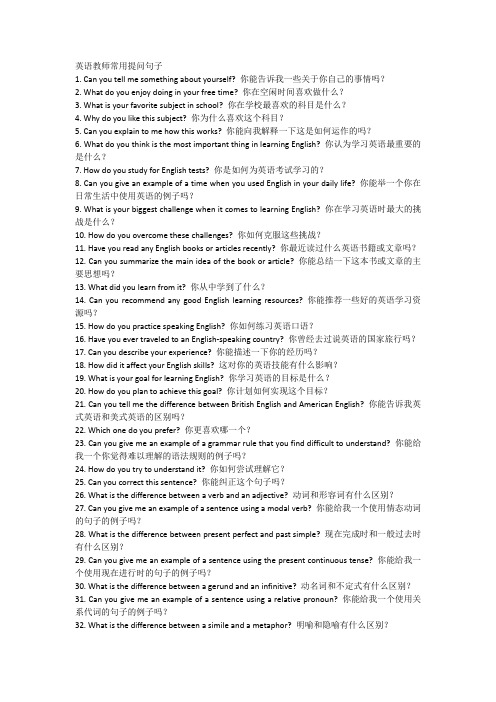
英语教师常用提问句子1. Can you tell me something about yourself? 你能告诉我一些关于你自己的事情吗?2. What do you enjoy doing in your free time? 你在空闲时间喜欢做什么?3. What is your favorite subject in school? 你在学校最喜欢的科目是什么?4. Why do you like this subject? 你为什么喜欢这个科目?5. Can you explain to me how this works? 你能向我解释一下这是如何运作的吗?6. What do you think is the most important thing in learning English? 你认为学习英语最重要的是什么?7. How do you study for English tests? 你是如何为英语考试学习的?8. Can you give an example of a time when you used English in your daily life? 你能举一个你在日常生活中使用英语的例子吗?9. What is your biggest challenge when it comes to learning English? 你在学习英语时最大的挑战是什么?10. How do you overcome these challenges? 你如何克服这些挑战?11. Have you read any English books or articles recently? 你最近读过什么英语书籍或文章吗?12. Can you summarize the main idea of the book or article? 你能总结一下这本书或文章的主要思想吗?13. What did you learn from it? 你从中学到了什么?14. Can you recommend any good English learning resources? 你能推荐一些好的英语学习资源吗?15. How do you practice speaking English? 你如何练习英语口语?16. Have you ever traveled to an English-speaking country? 你曾经去过说英语的国家旅行吗?17. Can you describe your experience? 你能描述一下你的经历吗?18. How did it affect your English skills? 这对你的英语技能有什么影响?19. What is your goal for learning English? 你学习英语的目标是什么?20. How do you plan to achieve this goal? 你计划如何实现这个目标?21. Can you tell me the difference between British English and American English? 你能告诉我英式英语和美式英语的区别吗?22. Which one do you prefer? 你更喜欢哪一个?23. Can you give me an example of a grammar rule that you find difficult to understand? 你能给我一个你觉得难以理解的语法规则的例子吗?24. How do you try to understand it? 你如何尝试理解它?25. Can you correct this sentence? 你能纠正这个句子吗?26. What is the difference between a verb and an adjective? 动词和形容词有什么区别?27. Can you give me an example of a sentence using a modal verb? 你能给我一个使用情态动词的句子的例子吗?28. What is the difference between present perfect and past simple? 现在完成时和一般过去时有什么区别?29. Can you give me an example of a sentence using the present continuous tense? 你能给我一个使用现在进行时的句子的例子吗?30. What is the difference between a gerund and an infinitive? 动名词和不定式有什么区别?31. Can you give me an example of a sentence using a relative pronoun? 你能给我一个使用关系代词的句子的例子吗?32. What is the difference between a simile and a metaphor? 明喻和隐喻有什么区别?33. Can you give me an example of a sentence using a simile? 你能给我一个使用明喻的句子的例子吗?34. What is the difference between a declarative sentence and an interrogative sentence? 陈述句和疑问句有什么区别?35. Can you give me an example of a sentence using a coordinating conjunction? 你能给我一个使用并列连词的句子的例子吗?36. What is the difference between a noun and a pronoun? 名词和代词有什么区别?37. Can you give me an example of a sentence using an adverb? 你能给我一个使用副词的句子的例子吗?38. What is the difference between a transitive verb and an intransitive verb? 及物动词和不及物动词有什么区别?39. Can you give me an example of a sentence using a preposition? 你能给我一个使用介词的句子的例子吗?40. What is the difference between a singular noun and a plural noun? 单数名词和复数名词有什么区别?41. Can you give me an example of a sentence using a possessive pronoun? 你能给我一个使用所有格代词的句子的例子吗?42. What is the difference between a subject and a predicate? 主语和谓语有什么区别?43. Can you give me an example of a sentence using a reflexive pronoun? 你能给我一个使用反身代词的句子的例子吗?44. What is the difference between a direct object and an indirect object? 直接宾语和间接宾语有什么区别?45. Can you give me an example of a sentence using an article? 你能给我一个使用冠词的句子的例子吗?46. What is the difference between a countable noun and an uncountable noun? 可数名词和不可数名词有什么区别?47. Can you give me an example of a sentence using a conjunction? 你能给我一个使用连词的句子的例子吗?48. What is the difference between a subject complement and an object complement? 主语补语和宾语补语有什么区别?49. Can you give me an example of a sentence using a disjunctive conjunction? 你能给我一个使用转折连词的句子的例子吗?50. What is the difference between a compound sentence and a complex sentence? 复合句和复杂句有什么区别?51. Can you give me an example of a sentence using a subordinating conjunction? 你能给我一个使用从属连词的句子的例子吗?52. What is the difference between a simple sentence and a compound sentence? 简单句和复合句有什么区别?53. Can you give me an example of a sentence using an interjection? 你能给我一个使用感叹词的句子的例子吗?54. What is the difference between a main clause and a subordinate clause? 主句和从句有什么区别?55. Can you give me an example of a sentence using a participial phrase? 你能给我一个使用分词短语的句子的例子吗?56. What is the difference between an active voice and a passive voice? 主动语态和被动语态有什么区别?57. Can you give me an example of a sentence using a past participle? 你能给我一个使用过去分词的句子的例子吗?58. What is the difference between a progressive tense and a simple tense? 进行时态和简单时态有什么区别?59. Can you give me an example of a sentence using a present participle? 你能给我一个使用现在分词的句子的例子吗?60. What is the difference between a first person pronoun and a third person pronoun? 第一人称代词和第三人称代词有什么区别?61. Can you give me an example of a sentence using a future tense? 你能给我一个使用将来时的句子的例子吗?62. What is the difference between a relative clause and an adjective clause? 关系从句和形容词从句有什么区别?63. Can you give me an example of a sentence using a modal auxiliary verb? 你能给我一个使用情态助动词的句子的例子吗?64. What is the difference between a transitive verb and an intransitive verb? 及物动词和不及物动词有什么区别?65. Can you give me an example of a sentence using a phrasal verb? 你能给我一个使用短语动词的句子的例子吗?66. What is the difference between a countable noun and an uncountable noun? 可数名词和不可数名词有什么区别?67. Can you give me an example of a sentence using a gerund? 你能给我一个使用动名词的句子的例子吗?68. What is the difference between a present tense and a past tense? 现在时和过去时有什么区别?69. Can you give me an example of a sentence using a past participle as an adjective? 你能给我一个使用过去分词作形容词的句子的例子吗?70. What is the difference between a subject and a predicate? 主语和谓语有什么区别?71. Can you give me an example of a sentence using a present participle as a noun? 你能给我一个使用现在分词作名词的句子的例子吗?72. What is the difference between a direct object and an indirect object? 直接宾语和间接宾语有什么区别?73. Can you give me an example of a sentence using a possessive adjective? 你能给我一个使用所有格形容词的句子的例子吗?74. What is the difference between a coordinating conjunction and a subordinating conjunction? 并列连词和从属连词有什么区别?。
《英语教学课堂设计》相关课堂提问与回答

英语教学课堂设计是教学中非常重要的一环。
其中,课堂提问与回答是教学中不可或缺的一部分。
通过提问,教师可以激发学生思考,检验学生的理解能力,引导学生学习,提高学生的学习积极性;通过回答,学生可以巩固知识,提高语言表达能力。
本文将就英语教学课堂设计中的课堂提问与回答展开讨论。
一、提问的种类1.直接提问直接提问是教师向学生提出具体问题,要求学生直接回答。
教师可以用"What's your name?"来问学生名字。
2.间接提问间接提问是先向一名学生提问,再由被提问的学生向另一名学生提问,如此循环。
教师问学生"What's the capital of France?",学生回答"Paris"后,会再问另一个学生"What's the capital of England?"二、提问的原则1.层次性原则在提问时,教师需要按不同的层次向学生提问。
首先是基础层次的问题,然后逐渐提高难度。
先问一些基础知识的问题,再逐步引导学生思考。
2.全面性原则在提问时,教师要尽量涵盖课文的各个方面,以促使学生全面理解课文内容。
对一篇课文的提问要囊括课文的主旨,细节,语言点等方面。
3.启发性原则在提问时,教师要注意问题的启发性,激发学生思考。
可以通过"为什么","如何"等问题引导学生深入思考和讨论。
三、回答的技巧1.完整回答学生回答问题时要尽量完整,不漏掉问题中的任何一个要点。
2.清晰回答学生回答问题时要表达清晰,语言准确。
可以通过举例,比喻等方式来让回答更加生动。
3.连贯回答学生回答问题时要注意回答的连贯性,能够合理组织语言,使回答更有条理。
四、我的观点和理解在英语教学课堂设计中,课堂提问和回答是非常重要的。
通过提问,能够激发学生的学习兴趣,检验学生的掌握情况;通过回答,能够巩固知识,提高语言表达能力。
小学英语问答知识点总结

小学英语问答知识点总结一、基础知识1. 英语字母及其发音问:英语中有多少个字母?它们的发音是什么样的?答:英语中有26个字母,包括五个元音字母:a, e, i, o, u,它们的发音分别是a, e, i, o, u;二十一个辅音字母:b, c, d, f, g, h, j, k, l, m, n, p, q, r, s, t, v, w, x, y, z等。
2. 问:怎么正确写英语字母?答:每个字母都有大写和小写形式,要正确地写英语字母,需要练习认识字母和手写字母。
大写字母比小写字母稍微高一些,小写字母有小圆圈或小弧线。
3. 数字问:英语中有几个数字?怎么写数字?答:英语中有10个数字,分别为0-9。
写数字时,要用正确的数字符号。
二、日常用语1. 问:你的名字是什么?答:My name is…2. 问:你好!你叫什么名字?答:Hello! What’s your name?3. 问:你几岁了?答: How old are you?4. 问:你生日是哪一天?答: When is your birthday?5. 问:你家里有几口人?答: How many people in your family?6. 问:你星期六通常做什么?答: What do you usually do on Saturday?答: What day is it today?8. 问:你家住在哪里?答: Where do you live?9. 问:你会说英语吗?答:Can you speak English?10. 问:你今天穿了什么颜色的衣服?答: What color is your clothes today?三、学校用语1. 问:你喜欢上学吗?答: Do you like going to school?2. 问:你最喜欢的学科是什么?答: What is your favorite subject?3. 问:你平时在学校做什么?答: What do you usually do in school?4. 问:你有多少个老师?答: How many teachers do you have?5. 问:你的学校有一百多个学生吗?答: Does your school have over 100 students? 6. 问:你有没有上过英语课?答: Have you ever had an English class?7. 问:你下周有什么特别的活动?答: What special activities do you have next week?8. 问:你晚上有没有做功课?答: Do you have homework in the evening?答: Where do you sit?10. 问:你和同学们一起在学校玩什么?答: What do you play with your classmates together in school?四、家庭用语1. 问:你家有什么?答:What’s in your house?2. 问:你家有没有宠物?答: Do you have any pets at home?3. 问:你家是几口人?有几个大人,几个孩子?答: How many people in your family? How many adults,how many children?4. 问:你家住在城市还是在乡村?答: Do you live in the city or the countryside?5. 问:你家房间多大?答: How big is your room?6. 问:你家房子有几层?有花园吗?答: How many floors does your house have? Do you have a garden?7. 问:你家有几个卧室?答: How many bedrooms do you have?8. 问:你家后面有没有菜园?答: Do you have a vegetable garden behind your house?9. 问:你晚上都和家人一起做什么?答: What do you do with your family in the evening?10. 问:你家有没有洗衣机?答: Do you have a washing machine at home?五、食物用语1. 问:你喜欢吃苹果吗?答: Do you like eating apples?2. 问:早餐你一般吃什么?答: What do you usually have for breakfast?3. 问:你中午吃饭吃什么?答: What do you eat for lunch?4. 问:你最喜欢的菜是什么?答:What’s your favorite dish?5. 问:你喜欢喝牛奶吗?答: Do you like drinking milk?6. 问:你周末喜欢和家人一起去餐厅吃什么?答: What do you like to eat with your family in a restaurant on weekends?7. 问:你觉得西瓜好吃吗?答: Do you think watermelon is tasty?8. 问:你喜欢喝果汁还是汽水?答: Do you like drinking juice or soda?9. 问:你妈妈会做什么她会做一些好吃的菜吗?答: What can your mother do? Can she make some tasty dishes?10. 问:你晚上吃点心吗?答: Do you have snacks in the evening?六、动物用语1. 问:你喜欢养宠物吗?答: Do you like keeping pets?2. 问:你家有狗还是有猫?答: Do you have a dog or a cat at home?3. 问:你们学校有小鸟吗?答:Does your school have any birds?4. 问:你觉得老虎很可爱吗?答: Do you think tigers are lovely?5. 问:你想要养一只兔子吗?答: Do you want to keep a rabbit?6. 问:你觉得小狗和小猫都很可爱吗?答:Do you think puppies and kittens are cute?七、颜色用语1. 问:红色的苹果好看吗?答: Do red apples look good?2. 问:你最喜欢的颜色是什么?答:What’s your favorite color?3. 问:你家有没有白色的沙发?答: Do you have a white sofa at home?4. 问:你喜欢穿黄色的衣服吗?答: Do you like wearing yellow clothes?5. 问:橙色的小猫好看吗?答: Do orange kittens look good?6. 问:你觉得绿色的小草很漂亮吗?答: Do you think green grass is very beautiful?八、日常活动1. 问:你每天都刷牙吗?答:Do you brush your teeth every day?2. 问:你喜欢游泳吗?答: Do you like swimming?3. 问:你每天都要做作业吗?答: Do you have to do homework every day?4. 问:你喜欢看书吗?答: Do you like reading books?5. 问:你每天都要做运动吗?答: Do you do exercise every day?6. 问:你爸爸妈妈会带你去旅游吗?答: Do your parents take you on a trip?七、天气用语1. 问:今天天气怎么样?答:What’s the weather like today?2. 问:你喜欢晴天还是阴天?答: Do you like sunny days or cloudy days?3. 问:你喜欢下雪吗?答: Do you like snow?4. 问:你喜欢下雨吗?答: Do you like rain?5. 问:夏天的天气怎么样?答:What’s the weather like in summer?6. 问:你觉得雨后的空气很清新吗?答: Do you think the air is very fresh after the rain?以上就是小学英语问答知识点总结,希望对你有所帮助!。
英语教师面试提问_经典的英语面试提问优秀7篇
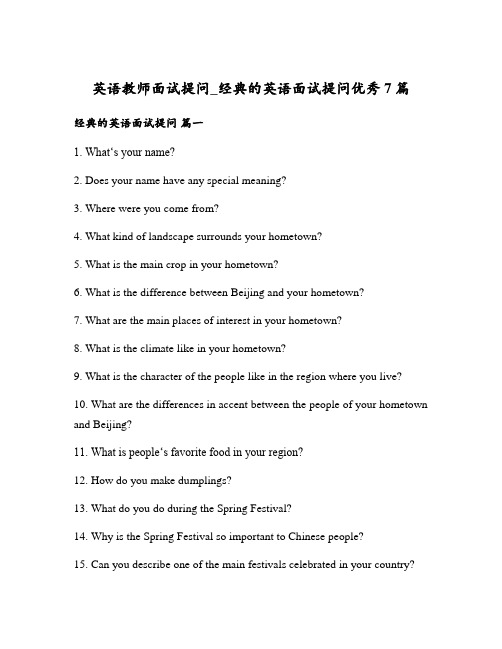
英语教师面试提问_经典的英语面试提问优秀7篇经典的英语面试提问篇一1. What‘s your name?2. Does your name have any special meaning?3. Where were you come from?4. What kind of landscape surrounds your hometown?5. What is the main crop in your hometown?6. What is the difference between Beijing and your hometown?7. What are the main places of interest in your hometown?8. What is the climate like in your hometown?9. What is the character of the people like in the region where you live?10. What are the differences in accent between the people of your hometown and Beijing?11. What is people‘s favorite food in your region?12. How do you make dumplings?13. What do you do during the Spring Festival?14. Why is the Spring Festival so important to Chinese people?15. Can you describe one of the main festivals celebrated in your country?16. Tell me something about the Lantern Festival.17. Tell me something about the Qing Ming Festival.18. Tell me something about the customs of your country.19. How long have you lived in Beijing?20. What is the weather like in Beijing?21. How do you compare the climate in Beijing with that in your hometown?22. What place in Beijing do you like best? Why ?23. Which is the worst place you‘ve been to China?24. Which is the best place you‘ve been t o China?25. What places in Beijing should a foreigner visit? Why?26. What are the major social problems in Beijing? How can they be solved?27. What is the biggest problem China faces?28. What places in Beijing should a foreigner visit? Why?29. Could you tell me something about your family?30. Have you any children?英语面试常见问题篇二英语面试中除了要求表述自己以前的工作情况和求职经历以外。
英语教师教学活动调查问卷 访谈问题

下面是一些访谈问题资料:拟采取的研究方法主要有:调查研究法;归纳法(数理统计);总结法(改革意见)①调查问卷:问卷一:对象为在校大学非英语专业大学生,目标数据为学生的现行英语课程学习状况,以及针对大学英语学习的需求分析,用于分析大学英语教学现存问题。
问卷二:对象为现任一线大学英语任课教师,了解其在教学实践中的感受,想法,以及存在的问题,引导其为大学英语教学谏言献策,并对英语专业化教学内容、方法给予建议和分析,用于具体的对策研究。
问卷三:对象为工作语言为英语的外企,或者国际业务量大的其他类型企业员工,目标数据为大学毕业生在工作中使用英语的诸多问题,如语言基础(词汇、语法等),写作表达,口语交流,专业文献的查询和阅读,文化意识在工作中的作用等等,用于了解当下与语言相关的工作对语言的需求和要求以及当事人的使用情况,从而为开展英语专业化教学提供指导意见。
②访问访谈:访谈一:对象为一些现任,并已经从教多年的初中英语任课教师,目标数据为新课程改革前后,重点是小学开设英语课后,初中生英语学习水平与课改前同龄学生的对比分析,用于证实当下在校学生和即将开始大学生活的高中生英语水平教早前有一定的提高,从而也说明了开展大学英语专业化教学研究的必要性。
访谈二:对象为大学部分国际化研究行为频繁的学科领域(如生物科技,医药领域,电子信息化技术,金融,管理等)的项目负责老师,硕士博士导师等,了解其专业学生进行专业领域国外文献资料查找和阅读方面的能力,存在的问题等,用于分析大学生本科阶段英语学习的状态。
访谈三:对象为工作语言为英语的外企,或者国际业务量大的其他类型企业管理者,目标数据为大学毕业生在工作中使用英语的真实情况,以及理想的员工外语水平,用于分析语言应用市场对人才的具体要求,从而为开展英语专业化教学提供依据。
访谈四:对象为大学教务管理者,公共英语学科教学负责人,了解大学公共英语教学在开展过程中可能出现的一些问题:如运作成本方面的师资需求,师资成本,硬件设备建设工作等;新课程开设管理方面的课时安排,教师授课标准,学生学习效果测评问题等,为本研究的可持续性系列研究提供方向,深化大学英语专业化教学改革。
小学教育英语问答模板范文

初级教育学校教育英语问答模板范文在初级教育学校阶段进修英语是特殊重要的,英语问答是培育同砚英语口语表达能力的一种有效方式。
以下是一个初级教育学校教育英语问答模板范文,救助同砚更好地进行英语问答练习。
主持人:大家好!欢迎来到今日的英语问答环节。
我是主持人,今日我们邀请了几位初级教育学校生来参与问答竞赛。
让我们先来熟识一下选手们。
请你们分别介绍一下自己。
选手A:大家好,我是A。
我喜爱读书和画画。
选手B:大家好,我是B。
我喜爱唱歌和跳舞。
选手C:大家好,我是C。
我喜爱打篮球和踢足球。
主持人:特殊好!此刻我们开始问答竞赛。
第一个问题是:What is your favorite subject?(你最喜爱的科目是什么?)选手A:My favorite subject is English. I like learning English because it is interesting.(我最喜爱的科目是英语。
我喜爱学英语因为它很有趣。
)选手B:My favorite subject is Music. I enjoy singing and dancing in the music class.(我最喜爱的科目是音乐。
我喜爱在音乐课上唱歌和跳舞。
)选手C:My favorite subject is PE. I like playing basketball and soccer in the PE class.(我最喜爱的科目是体育。
我喜爱在体育课上打篮球和踢足球。
)主持人:很棒!下一个问题是:What do you do in your free time?(你在空闲时间做什么?)选手A:In my free time, I like reading books and drawing pictures. It makes me feel relaxed and happy.(在我的空闲时间,我喜爱读书和画画。
